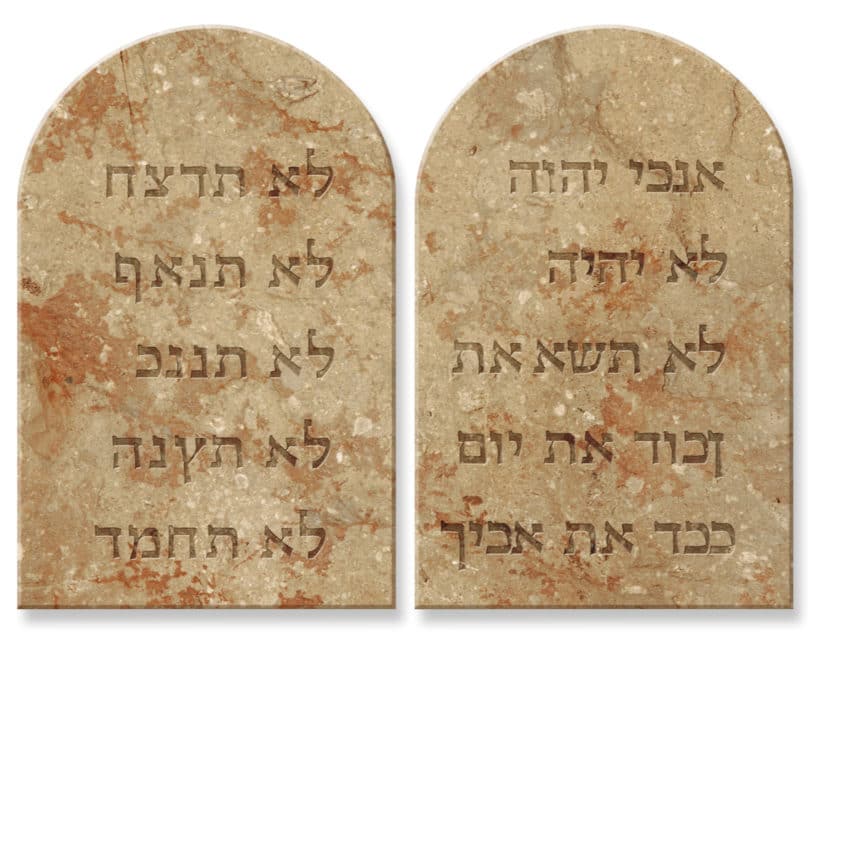
Engraved Freedom – Thoughts on Torah Portion Yitro
We read in the Torah that the 10 Commandments were engraved on stone tablets. There is a well known rabbinic word play on the word “engraved.” The Hebrew word for “engraved” in Exodus 32:15 is “charut” (rhymes with “root”). The exact same Hebrew letters with different vowels, however, spell out the Hebrew word “cheirut,” which means “freedom.”
The word play was irresistible to the ancient Rabbis. “Torah charut al ha-luchot” means “the Torah is engraved on the Tablets,” while “Torah – cheirut al haluchot” means “Torah is freedom on the tablets.” You need two more pieces of information to really understand this wordplay. In biblical Hebrew, the word “luchot” (slabs, or tablets) also refers metaphorically to the heart. The “tablets of the heart” refer metaphorically to the mind and passions of the ego self that form our lives. Therefore, if you say “cheirut” on the “luchot,” you have the idea that Torah is “freedom on the heart.” How can law be freedom?
The usual answer, a pretty good one, is that, spiritually speaking, only with law can we be free. Free from what? Free from the “yetzer hara,” the shaping toward destructiveness that resides in the hidden recesses of the ego self, the secret chambers of the heart.
Law that brings us freedom means something like the moral law and paths of virtue: patterns of thought, speech and behavior that lead, immediately or eventually, to well-being, for ourselves and for others. We need law because all of us, in some dimension of our being, rebel against the moral code, the code of virtue and wisdom. The yetzer hara makes us stray from the path of truth.
We need law, we need commandments, because there are lines that we should not cross. Conscience should be our guide, but the strength of the Yetzer HaRa pushes up against the conscience, destabilizes us, disregulates us. The moral code, as law, can function as a buttress against the waywardness of the Yetzer HaRa.
So far so good. Now apply this to our interpersonal lives. Those who have been anywhere near me in the last number of years when I talk about virtue in relationships, know my view – that criticism and complaint, conflict and senseless arguing gnaw away at the goodness that close relationships should bring. Criticism and complaint are always rooted in some kind of personal law, some standard, some regulation that a given person feels that the other person must obey. We unconsciously demand that other people be compliant. The yetzer hara has us impose our law on others. Not the moral code, but our own law.
In every counseling session regarding interpersonal relationships, the back and forth tension is often between power and freedom. Each one wants the power to enforce “the law” on the other, and each one demands freedom from the unreasonable “law” of the other. (I gratefully credit the famed psychologist William Glasser for the “power/freedom” idea.)
Law as virtue gives us the freedom to grow. The law of virtue helps us be free from the urge to control others. Law as virtue allows us to govern ourselves with an eye toward what is good, not that which gives us control over others. Law as virtue also helps us to not act in defiance or resentment – pushing back does not necessarily make us free. Freedom is found in creating beauty, balanced between the need for order and the need for liberty.
Where do we start in order to find the balance? I think of Proverbs 31, “Eshet Chayil,” “A Woman of Valor,” as a way to guide our thinking. The Kabbalists taught that this “woman” is the Shekhina, the feminine immanence of the Divine, who enters the home especially on the Sabbath. In Proverbs 31:26 we read, “She opens her mouth with wisdom; the Torah of loving kindness is on her tongue.” This verse is an aspiration for all of us.
Perhaps the first commandment of our “Torah of virtue” is dual, “wisdom and loving kindness.” In wisdom and loving kindness, each with its own urging on the conscience, a Torah of authentic humanity can be found. In our liturgy, we ask “sim shalom, tovah, uvrakhah; chen, ve-chesed ve-rachamim,” “establish peace, goodness, blessing; grace, loving kindness and compassion.” On this Sabbath of the 10 Commandments, let’s engrave this prayer on the tablets of our inner lives and find freedom in its law, and welcome the Immanence of the Divine into our homes and our hearts.























 More news and opinions than at a Shabbat dinner, right in your inbox.
More news and opinions than at a Shabbat dinner, right in your inbox.